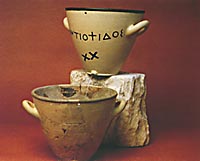

In the Iliad (10.443), Achilles' tutor Phoenix reminds the Myrmidon leader that Achilles' father Peleus had entrusted the boy's education to him, so that he should become "competent in word and worthy in deed". Even at that early date, it was regarded as an advantage to be able to persuade a group of people verbally. In historical times there were many examples of people who persuaded the Athenians to adopt their views. We need only think of Solon and the annexation of Salamis; Themistocles and the creation of the Athenian fleet; or Pericles' career in general and the swing of public opinion in his favour.
The art of rhetoric is the systematic cultivation of
the ability of the human being to speak. It is dictated by rules,
and requires teachers and writings. Its development presupposes
1) freedom of speech and 2) the need to express one's opinions in
public. These conditions were fulfilled in the democratic Athens
of the
The first definition of what rhetoric is was given by Korax from Syracuse: it is typically, he said, an art "creative of persuasion". Tradition had it that the first handbook of rhetoric was written by Korax in collaboration with his fellow-Syracusan Tisias.
Back in Athens, both the law-courts and the Assembly of the People provided an opportunity and indeed an obligation for the citizen to express his opinion. But the time allowed for speaking was, like the range of subjects, restricted: hence the need for the intending speaker to work on his text beforehand. This meant that the specialist professional teachers of rhetoric began to be in great demand. These were the Sophists - teachers who guaranteed to help their pupil make his mark on society. It was from the Sophist group that the first professional orators came: they taught their skills, or made their wares available, in exchange for money. One famous teacher of orators was Isocrates; one important speech-writer was Lysias. |
 |
Once fees were being taken for lessons in public speaking, it was obviously only the rich who could afford the luxury of this education. The economically weaker either had to have a natural flair for speaking convincingly, or they had to forgo speaking and simply side with one view or the other.
The Alexandrian scholars drew up a table of ten orators whose
works were thought to be classic examples of the art. This was
the celebrated Canon List of the ten Attic orators:
Antiphon of Rhamnus (b.480/70 d.410); Andocides of Athens (b.440
d.391); Lysias of Athens
(b.445 d.380); Isaeus of Chalcis
(b.420 d. at some time in the first half of the 4th
century); Isocrates of Athens
(b.436 d.338/37); Hyperides of Athens (b.390 d.322);
Lycurgus of Athens (b.390 d.324); Aeschines of Athens (b.390
d.330); Demosthenes of Athens
(b.385/84 d.322); and Dinarchus of Corinth (b.320 d.292). Here
we should also mention the speeches in Thucydides' History.
These are a specimen of political oratory, with the exception of
the Funeral Oration, which belongs to the virtuoso style.
 |
 |
|
| |
|||
| |||